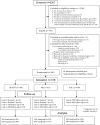Effectiveness of a computerized motivational intervention on treatment initiation and substance use: Results from a randomized trial
- PMID: 28755774
- PMCID: PMC5564468
- DOI: 10.1016/j.jsat.2017.07.002
Effectiveness of a computerized motivational intervention on treatment initiation and substance use: Results from a randomized trial
Abstract
As many as 80% of the nearly five million adults under community supervision (i.e., probation, parole) are substance involved; however, treatment utilization is low. Using a multi-site randomized controlled trial, we tested the efficacy of in-person motivational interviewing (MI), a motivational computer intervention (MAPIT), or standard probation intake (SAU) to encourage treatment initiation among 316 substance-involved probationers in Dallas, Texas and Baltimore City, Maryland. Ninety-three percent (n=295) of participants completed the 2-month follow-up and 90% (n=285) completed the 6-month follow-up. At 2-months, individuals in the MAPIT condition were more likely to report treatment initiation compared to the SAU condition (OR=2.40, 95% CI=1.06, 5.47) via intent-to-treat analysis, especially among those completing both sessions (RE=0.50, 95% CI=0.05, 0.95) via instrumental variable analysis. At 6-months, MAPIT approached significance for treatment initiation in both analyses. MI did not achieve significance in any model. We did not find any differential impact on substance use. The success of MAPIT suggests that an integrated health-justice computerized intervention as part of a Screening, Brief Intervention, and Referral to Treatment (SBIRT) can be used to address public safety and health issues.
Trial registration: ClinicalTrials.gov NCT01891656.
Keywords: Computer; MAPIT; Motivation; Probation; Substance use; Treatment initiation.
Copyright © 2017 Elsevier Inc. All rights reserved.
Conflict of interest statement
References
-
- Bandura A. Social Foundations of thought and action: a social cognitive theory. Englewood Cliffs, NJ: Prentice-Hall; 1986.
-
- Bonta J, Bourgon G, Rugge T, Scott TL, Yessine AK, Gutierrez L, Li J. An experimental demonstration of training probation officers in evidence-based community supervision. Criminal Justice Behavior. 2011;38:1127–1148.
-
- Center for Behavioral Health Statistics and Quality. Key Substance Use and Mental Health Indicators in the United States: Results from the 2015 National Survey on Drug Use and Health. Rockville, MD: Substance Abuse and Mental Health Services Administration US Dept. of Health and Human Services; 2016.
Publication types
MeSH terms
Associated data
Grants and funding
LinkOut - more resources
Full Text Sources
Other Literature Sources
Medical
Research Materials


